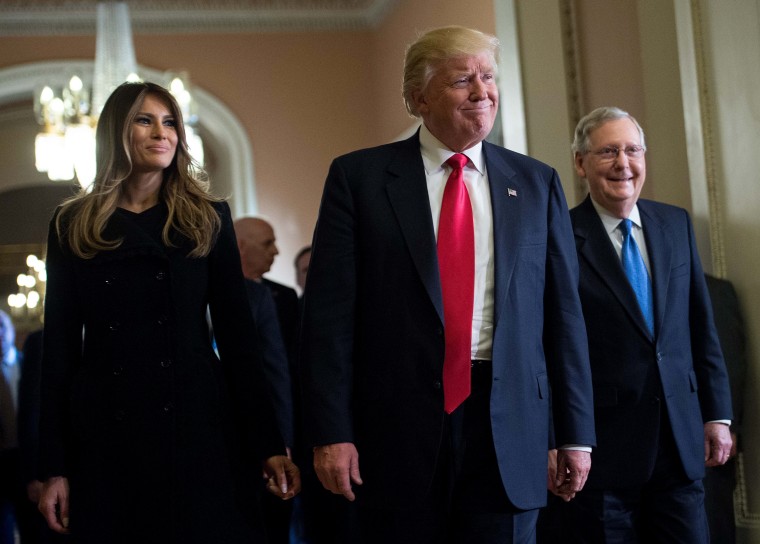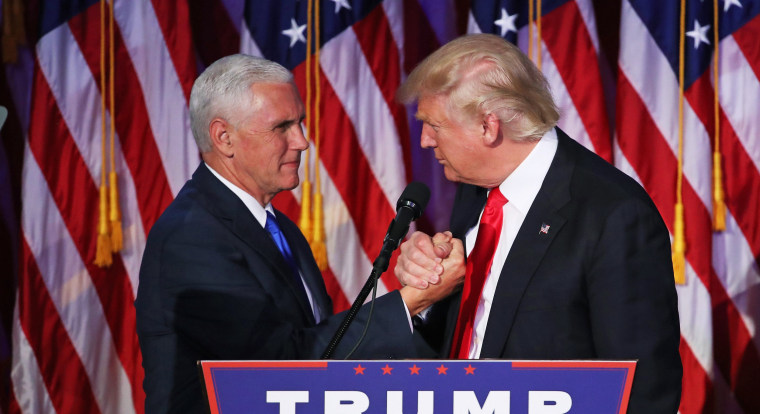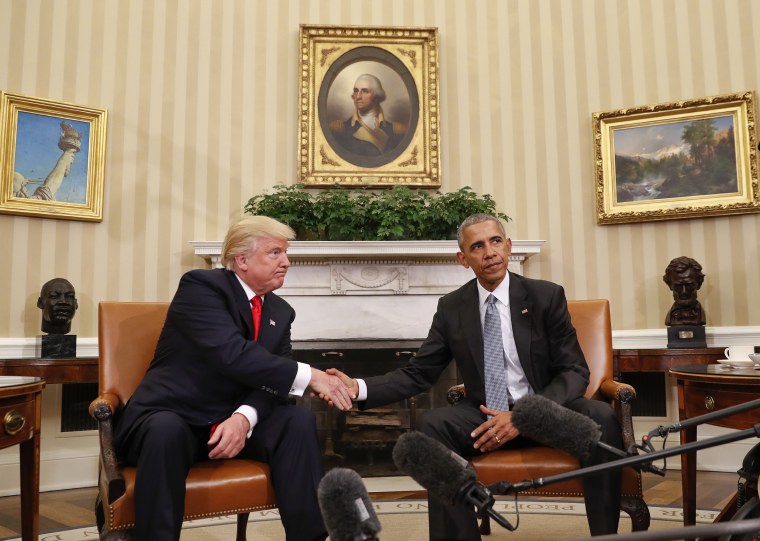President-elect Donald Trump released his “Contract With the American Voter” in October. Also known as his “100-day action plan to Make America Great Again,” it is an overview of what the administration will begin to implement in his first months in office. Many of the points in the document, however, have caused ripples of panic among lesbian, gay, bisexual, transgender and queer advocates and fears about whether his administration could reverse eight years of progress for the community under President Obama

NBC OUT turned to policy experts at national LGBTQ organizations to help determine which of Trump’s stated plans are most likely to directly impact the community—and which aren’t worth worrying about just yet.
Overturning Marriage Equality
In a Facebook Live video posted on Thursday afternoon, the staff at Human Rights Campaign (HRC) addressed post-election concerns from members of the LGBTQ community. The HRC policy experts said they had received a flood of questions from the community in the days following the election, starting with concerns about whether same-sex marriage might be overturned.
While nothing in Trump's 100-day play explicitly states he'll try to roll back same-sex marriage rights, it does state he will "begin the process of selecting a replacement for [Supreme Court] Justice Scalia … who will uphold and defend the U.S. Constitution." In the past, Trump has also said he would "strongly consider" appointing Supreme Court justices committed to overturning the ruling that legalized same-sex marriage.

Trump’s running mate Mike Pence, however, has a clear track record of anti-same-sex-marriage views. He insinuated in 2006 that same-sex marriage would bring upon “societal collapse,” he spoke out against the 2013 repeal of the Defense of Marriage Act and he tried (unsuccessfully) in 2014 to block a same-sex marriage court ruling in his home state of Indiana. That same year, Pence tried—and again failed—to amend the state’s constitution to ban same-sex marriage.
So, could we see the overturning of Obergefell v. Hodges, the 2015 Supreme Court ruling that legalized same-sex marriage nationwide?
“Virtually nothing is impossible in the United States, but it’s not likely,” HRC Legal Director Sarah Warbelow said. “Congress and President-elect Trump do not have the power to unilaterally undo marriage equality.”
Warbelow also emphasized that while Trump has stated plans to install a conservative Supreme Court justice to fill the seat left vacant by Antonin Scalia, who died earlier this year, all five of the judges who ruled in favor of same-sex marriage are still on the bench.
Cancellation of Obama's Executive Actions
Of all the bullet points in Trump’s "Contract With the American Voter," the most worrisome for the LGBTQ community may be his stated plan to “cancel every unconstitutional executive action, memorandum and order issued by President Obama.”
Some of the Obama administration’s major protections for the LGBTQ community have taken the form of memorandums and final rules—such as this spring’s double whammy memos for the Department of Education (DOE) and Department of Health and Human Services (HHS), which clarified that gender identity is a protected class in terms of health care coverage and equal access to education facilities.

Could Trump undo those rulings, causing insurance companies to drop transgender patients and forcing trans students to use bathrooms and showers based on their assigned sex at birth?
NBC OUT spoke with Lambda Legal Law & Policy Director Jennifer Pizer, who focused on the use of the word “unconstitutional” in Trump’s plan.
“There have been wild claims by some critics of the Obama administration that many policies and actions taken by agencies and the White House have been unconstitutional. That’s simply not true,” Pizer said. “In the ‘contract,’ this stated promise is only to cancel 'unconstitutional' actions. If that promise is kept, the Trump administration will not be withdrawing much at all.”
That doesn’t necessarily mean that Trump and Pence won’t try to re-clarify the HHS and DOE rulings anyway. But if they do, Pizer added, “It will not be because they were unconstitutional. It will be because the new administration disagrees.”
Regardless of whether Trump tries to reconfigure the federal policies on transgender equality, there will always be legal recourse to challenge the new policies.
“Keep in mind that much of the Obama Administration’s activity was interpretation and enforcement of federal statutes based on court decisions,” Pizer told NBC OUT. “Those decisions will remain in place whether the new administration changes those regulations and ‘guidance’ or not.”
Repeal of Affordable Care Act
In his 100-day plan, Trump states he will "repeal and replace Obamacare." He plans to replace the Affordable Care Act (ACA), Obama's signature piece of legislation, with “Health Savings Accounts" and "the ability to purchase health insurance across state lines.” This particular provision is poised to impact millions of Americans, not just the LGBTQ community.
But for LGBTQ people specifically, the repeal of the ACA, or Obamacare as it's often called, has caused fear around coverage for gender-reaffirming care, spending caps on coverage for HIV-related treatment and the impact on Medicaid and Medicare for low-income segments of the community.
“They can do it, and they intend to do it,” HRC Government Affairs Director David Stacy said in the Facebook Live discussion. “But if you’re in an ACA health care plan right now on the exchange, or you’re in a Medicaid program, you’re not going to have your health care cut off in the immediate term. If they are successful in repealing it, there’s going to be some sort of transition period.”
RELATED: Shocked and Disappointed, LGBTQ Activists Vow to Fight On
If and when Trump does repeal the ACA, the harshest impact will be felt on LGBTQ people with lower incomes as well as those with pre-existing conditions.
“Repeal of this law very likely means a return to the bad old days of pre-existing condition exclusions from health insurance and denials of insurance outright,” Pizer of Lambda Legal said. “Repeal also very likely would mean an end to the important federal subsidies for people of limited means. Leaving Medicaid to states likely would mean a dramatic change in that program and deeply problematic decreases in care for those who are most vulnerable.”
And as one HIV-positive man told NBC OUT on Wednesday at an anti-Trump protest in New York, losing the ACA could mean a return to insurance spending caps—a dangerous prospect for people living with the virus or people living with chronic conditions that result in high health-care costs.
“If they roll back the spending caps, I can never have a lapse in employment. My pills cost over $3,000 a month,” Christen Madsen II said, while standing outside Trump Tower. “And they used to be able to put a cap on the amount insurance would cover for prescriptions, so that could come back.”
Other Concerns
Aside from concerns about what's specifically in Trump's "Contract With the American Voter," LGBTQ Americans have a long list of other concerns about what a Trump presidency will mean for them—and the rights they've gained under President Obama.
During Thursday's Facebook Live chat, the HRC team addressed a number questions related to military service, "religious freedom" bills, hate crime protections and other topics related to anti-LGBTQ discrimination.
Military Service
David Stacy, of HRC, said the repeal of "don't ask, don't tell" is "exceedingly unlikely."
"One of the reasons is, openly LGB service in the military has been phenomenally successful … The military leadership of our country feels good about it," he explained.
“Transgender military service has just begun, and I think that is a little more at risk … But once the military starts to implement something, it takes a lot of energy to change course," Stacy added.
Hate Crimes
As for criminal justice, HRC's Warbelow said it is unlikely Trump and Pence would overturn the Hate Crimes Prevention Act, but she did add the new Department of Justice leadership may not pursue hate crime investigations as fiercely as the Obama administration has.
Discrimination
Vice President-elect Mike Pence told evangelical radio host Dr. James Dobson on Wednesday that "The Trump-Pence administration will be dedicated to preserving … the freedom of religion that's enshrined in our Bill of Rights." Pence issued the phrase in response to questions about whether his administration would work to make sure religious businesses don’t have to cover birth control for employees, but critics note "religious freedom" bills can result in discrimination against LGBTQ people.
As far as legal protection from discrimination, HRC’s Warbelow reminded Facebook Live viewers that there’s still no federal anti-discrimination clause protecting LGBTQ people from discrimination in public facilities. But many states and cities do have anti-discrimination laws in place that specify sexual orientation and gender identity—those will most likely not be affected by the new administration.
RELATED: Anti-Trump Protesters Fear Rollback of LGBTQ Rights
However, existing routes for gaining recourse when employment and housing discrimination occur may be altered.
“What will likely happen with this new administration is that they will not enforce those laws in the same way as President Obama’s administration,” Warbelow explained. “The Department of Justice, the EEOC, the Department of Labor will not as robustly enforce and they will unfortunately turn their back on the LGBT community—but people still can have legal recourse and file those complaints.”
Parenthood
During Thursday's Facebook Live conversation, the HRC staff suggested same-sex parents make sure that adoption papers and birth certificates for their children are intact with names of both parents, just to be cautious.
Going Forward
While lesbian, gay, bisexual, transgender and queer Americans wait for more of President-elect Trump's policy plans to be revealed, the hope is that he will make good on his victory speech promise to be "president for all Americans"—including LGBTQ Americans.